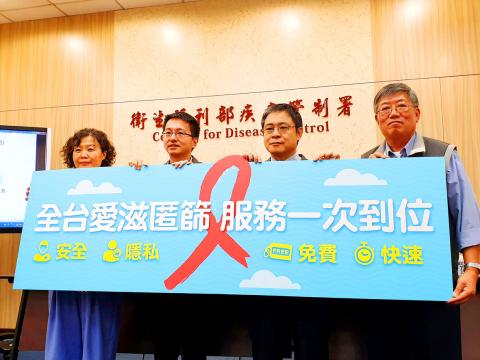The testing process for HIV infection in Taiwan has been streamlined as 12 hospitals nationwide on Monday began to offer anonymous diagnoses within an hour, the Centers for Disease Control (CDC) said.
The new “one-stop” rapid HIV testing service, which detects HIV antibodies in the blood, gives a preliminary result in 20 minutes, it said.
Patients who test positive for the virus are then immediately given a second test that gives a final result within 30 minutes, meaning the process is completed in under an hour, CDC Chronic Infectious Diseases Division head Huang Yen-fang (黃彥芳) said.

Photo: CNA
Treatment for those who test HIV-positive can begin the same day, Huang said told a news conference promoting the new process that hospitals in Taipei, Taoyuan, Hsinchu, Taichung, Tainan and Kaohsiung have started to provide.
Another 47 hospitals have started to provide anonymous, preliminary same-day testing services and would send those whose tests are positive to other medical facilities for a final diagnosis, Huang said.
The test kits used by the new service are the same as used before, when it took two to three weeks for HIV-infected people to receive treatment after taking the initial test, the CDC said.
Under the previous system, appointments were also required for a second test and subsequent treatment, which increased the risk of the virus spreading, it said.
CDC Deputy Director-General Philip Lo (羅一鈞) said that 610 people tested HIV-positive last year in initial tests, but 99 did not return to a hospital for final confirmation.
The new “one-stop” testing service would bridge the time gap between diagnosis and treatment, allowing more patients to receive timely medical and psychological support, the CDC said.
People who have had sexual intercourse should take at least one HIV test in their lifetime, Huang said, adding that people who have had unsafe sex should take at least one HIV test every year.
As of the end of last month, there were about 39,000 people with HIV in Taiwan and more than 18,000 of them have developed AIDS, CDC statistics showed.

Taiwan is stepping up plans to create self-sufficient supply chains for combat drones and increase foreign orders from the US to counter China’s numerical superiority, a defense official said on Saturday. Commenting on condition of anonymity, the official said the nation’s armed forces are in agreement with US Admiral Samuel Paparo’s assessment that Taiwan’s military must be prepared to turn the nation’s waters into a “hellscape” for the Chinese People’s Liberation Army (PLA). Paparo, the commander of the US Indo-Pacific Command, reiterated the concept during a Congressional hearing in Washington on Wednesday. He first coined the term in a security conference last

Prosecutors today declined to say who was questioned regarding alleged forgery on petitions to recall Democratic Progressive Party (DPP) legislators, after Chinese-language media earlier reported that members of the Chinese Nationalist Party (KMT) Youth League were brought in for questioning. The Ministry of Justice Investigation Bureau confirmed that two people had been questioned, but did not disclose any further information about the ongoing investigation. KMT Youth League members Lee Hsiao-liang (李孝亮) and Liu Szu-yin (劉思吟) — who are leading the effort to recall DPP caucus chief executive Rosalia Wu (吳思瑤) and Legislator Wu Pei-yi (吳沛憶) — both posted on Facebook saying: “I

The Ministry of Economic Affairs has fined Taobao NT$1.2 million (US$36,912) for advertisements that exceed its approved business scope, requiring the Chinese e-commerce platform to make corrections in the first half of this year or its license may be revoked. Lawmakers have called for stricter enforcement of Chinese e-commerce platforms and measures to prevent China from laundering its goods through Taiwan in response to US President Donald Trump’s heavy tariffs on China. The Legislative Yuan’s Finance Committee met today to discuss policies to prevent China from dumping goods in Taiwan, inviting government agencies to report. Democratic Progressive Party Legislator Kuo Kuo-wen (郭國文) said

The Ministry of Economic Affairs has fined Taobao NT$1.2 million (US$36,900) for advertisements that exceeded its approved business scope and ordered the Chinese e-commerce platform to make corrections in the first half of this year or its license would be revoked. Lawmakers have called for stricter supervision of Chinese e-commerce platforms and more stringent measures to prevent China from laundering its goods through Taiwan as US President Donald Trump’s administration cracks down on origin laundering. The legislature’s Finance Committee yesterday met to discuss policies to prevent China from dumping goods in Taiwan, inviting government agencies to report on the matter. Democratic Progressive Party